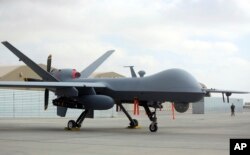U.S. special forces in partnership with Afghan counterparts have eliminated 22 Islamic State fighters in a counterterrorism operation in northern Afghanistan.
The operation occurred April 11. The targeted militants were attempting to defend Darzab district, the group’s “strategic center” in Jowzjan province, said a U.S. military statement Sunday.
On April 5, a U.S. airstrike in Darzab killed IS commander for northern Afghanistan Qari Hekmatullah and his bodyguard, dealing a major blow to the group.
The Middle East-based terrorist group runs its regional extremist operations under the name of IS Khorasan or IS-K.
The U.S. military said persistent joint military pressure in Jowzjan has “reduced IS-K to an isolated group of fighters devoid of leadership." Since the beginning of the year, 90 IS-K fighters have been killed in Afghanistan, a majority were eliminated in Darzab, the U.S. military added.
“The recent Afghan and U.S. special operations raid will lead to the tactical defeat of IS-K in northern Afghanistan,” stated Gen. John Nicholson, who commands U.S. and NATO forces in Afghanistan.
The U.S. military said IS-K in Jowzjan “now selects its leaders from a dwindling, revolving door of insurgents with a history of divided loyalties.”
Jowzjan is next to Afghanistan’s border with Central Asian states. IS-K’s increasing footprints in the area have raised alarms in Russia. Moscow insists the terrorist group is establishing its bases in northern Afghan areas to threaten security of Russian regional allies.
IS-K has appointed Mawlavi Habibul Rahman, an Uzbek militant leader, as commander, following Hekmatullah's death. Sunday’s statement said the new leader has had intermittent ties to both Taliban and militants linked to the outlawed Islamic Movement of Uzbekistan.
U.S. military commanders, however, dismiss Russian assertions, saying Moscow exaggerates any IS presence in Afghanistan to justify its overt ties to the Taliban insurgency in an attempt to undermine Afghanistan’s gains against terrorism with the support of international partners.
Afghan leaders said there are currently less than 2,000 IS-K fighters in the country, mainly operating in eastern province near the border with Pakistan and contradicting Russian claims that the number runs into several thousands and that militants fleeing Syria and Iraq are also joining them.





